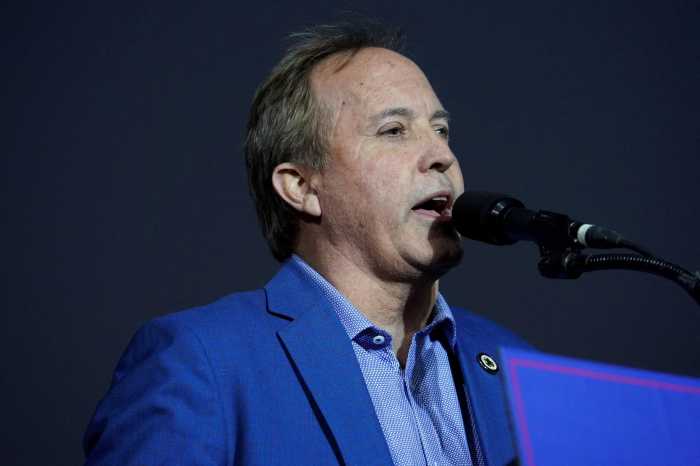The Supreme Court began its October 2022 Term (which runs through June 2023) on October 3, announcing the addition of several cases to its hearing docket, including a petition by Leon Santos-Zacaria, a transgender woman from Guatemala, to review the Fifth Circuit Court of Appeals decision dismissing her appeal of an adverse ruling by the Board of Immigration Appeals (BIA) in her case.
According to the petition for review, Santos-Zacaria had been previously deported from the US but managed to come back without permission. Homeland Security targeted her for removal again, and due to the prior deportation order, she could not apply for asylum.
Conceding removability, she sought two kinds of relief: withholding of removal, or protection under the Convention Against Torture (CAT). To obtain withholding of removal, she had to prove that she would probably suffer persecution on account of her sexual orientation or gender identity in Guatemala. To obtain CAT protection, she would have to show that it is more likely than not that she would be intentionally inflicted with severe pain or suffering if returned to Guatemala, either by the government (usually police) or by private actors whom the government was unwilling or unable to control.
According to the Fifth Circuit opinion, she credibly claimed to have been sexually assaulted by a neighbor when she was 12 years old and claimed that she was likely to face persecution because of her transgender status if she was removed back to Guatemala.
The immigration judge rejected both forms of relief, finding that she had failed to show she would probably be subjected to persecution or torture in Guatemala. She appealed to the BIA, which reversed the immigration judge’s finding on past persecution, concluding that the record showed she had suffered persecution, which gives rise to a presumption of future persecution.
However, the BIA concluded that the government had rebutted that presumption because she had admitted during cross-examination at the hearing before the immigration judge that there were places in Guatemala where she could relocate to avoid persecution. The immigration judge also found that the record did not support her CAT claim.
She argued to the Fifth Circuit that the BIA had improperly ruled on the government’s rebuttal evidence, since the BIA was acting in an appellate role and fact-finding should be done first by the immigration judge. The immigration judge’s opinion did not mention any government rebuttal, because in the immigration judge’s view, there was no presumption of future persecution to rebut. In her appeal to the BIA, she had asked that it send the case back to the immigration judge for further fact-finding on several issues, including the government’s argument that she could safely relocate elsewhere in Guatemala.
But the Fifth Circuit majority asserted that it had no jurisdiction to consider this argument, because she had not made the argument directly to the BIA after it had ruled against her. Under immigration law, a petitioner is supposed to “exhaust administrative remedies” before seeking judicial review of an administrative ruling by the BIA. The court said that after the BIA had rejected her petition for withholding of removal, she should have raised the “impermissible fact-finding” issue in a motion to reconsider and send the case back to the immigration judge for further fact-finding.
Circuit Judge Stephen Higginson dissented, arguing that the BIA had “exceeded its scope of review by engaging in impermissible factfinding,” pointing out that when the BIA determined that the presumption of future persecution had been rebutted, it was violating a published regulation, because the immigration judge had not ruled on that issue. “Santos adequately requested that the Board remand her case for additional fact-finding,” he wrote, “so we have jurisdiction to review this claim.”
He also criticized the BIA and the Fifth Circuit panel majority for pulling one sentence of the petitioner’s hearing testimony out of context to make it sound like she had agreed that there were places in Guatemala where she could relocate. His dissent included more extended quotations from the hearing transcript, showing that she had stated that there was no safe place for her in Guatemala.
“The whole country Guatemala it’s going to be the same for me because there is no police in — anywhere that is going to protect me so I’m not going to get what I’m looking for so that’s why I want to stay in this country because I know I’m going to have that protection here,” she testified.
The government attorney cross-examining her pointed out that there were Pride parades in some cities and suggested that she could move to those cities rather than the place she had lived.
“Yes, probably there is another place where I can live down there… but I try to stay here to get this protection because besides that I have a brother living here so I’m trying to have him help me.”
Wrote Higginson, “Although it urged this court to rely on this hypothetical, the Government during oral argument before our court could not ‘recall that specific snippet of the record’ in which Santos categorically denied being unable to relocate safely within Guatemala.” Furthermore, he pointed out, “throughout the exchange, Santos spoke in Kanjobal, a Mayan language spoken in parts of Guatemala, through an interpreter.” He characterized the testimony relied on by the government as a “vague and equivocal statement in response to the government’s hypothetical question” which, he argued, “does not constitute an admission that she could safely relocate within Guatemala, where she was twice raped.”
Furthermore, Higginson, wrote, the BIA’s opinion failed to mention evidence in the form of a US State Department Human Rights report noting that one of the “most significant human rights issues” in Guatemala includes “police violence against lesbian, gay bisexual, transgender and intersex individuals,” as well as “general societal discrimination against LGBTI persons in access to education, health care, employment and housing” and that “the government undertook minimal efforts to address this discrimination.”
In light of the State Department report, he argued that Santos-Zacaria might be eligible for relief under CAT as well as for withholding of removal.
The Supreme Court granted the petition for review on two questions concerning exhaustion of administrative remedies as to which the courts of appeals are split: first, whether the statute’s exhaustion requirement “is jurisdictional, or merely a mandatory claims processing rule that may be waived or forfeited,” and second, whether to satisfy the exhaustion requirement “a noncitizen who challenges a new error introduced by the BIA must first ask the agency to exercise its discretion to reopen or reconsider.”
The Court will likely hear arguments in this case early in 2023.
In another move announced on October 3, the court granted a motion by the Solicitor General to participate in the oral argument in 303 Creative v. Elenis, in which the Court will consider whether a web designer who wants to expand her business to wedding websites must comply with the Colorado public accommodations law that bans sexual orientation discrimination.
The proprietor of 303 Creative has religious objections to same-sex marriages and claims a First Amendment free exercise and free speech right to reject such business and to announce her policy on her website. The 10th Circuit Court of Appeals rejected her claim. The Supreme Court agreed to hear her appeal but limited its consideration to her free speech claim. She argues that requiring her to make websites for same-sex marriages would be a form of compelled speech communicating approval of such marriages.
The Biden Administration filed an amicus brief in support of the State of Colorado, which is defending the application of its anti-discrimination law. Solicitor General Elizabeth B. Prelogar’s motion to expand the time for oral argument and to take 15 minutes to present the government’s position was granted by the court, with the agreement by counsel for the parties. Her motion pointed out that the federal government has two public accommodations anti-discrimination laws, Title II of the Civil Rights Act of 1964 and the Americans With Disabilities Act, so it has a direct interest in whether for-profit businesses can refuse to comply with such laws on free speech grounds.
The court has been flooded with amicus briefs on both sides in the 303 Creative case, in which briefing was concluded a few weeks ago. As of October 3, the Court had not announced when the oral argument will be held, but it is likely to be before the end of 2022.


































